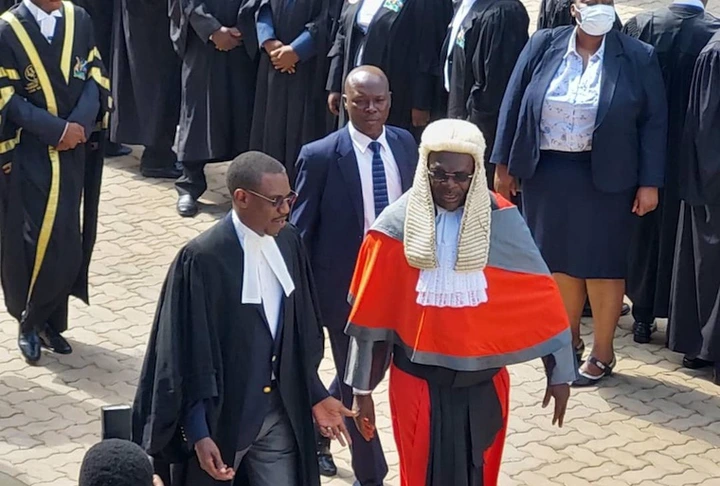Civilians in military courts: 25 years of judicial rigmarole

On a date to be agreed with the judiciary shortly, I will lead a high-level delegation of the Uganda Law Society (ULS) to meet with the chief justice, Alfonse Chigamoy Owiny-Dollo, on behalf of countless individuals and families whose lives have been torn apart by the lack of clarity on the legal framework governing military courts.
This matter has plagued our justice system for nearly two decades, resulting in egregious violations of fundamental constitutional rights and demands immediate redress. The Uganda People’s Defence Forces Act (UPDF Act), which commenced on 2 September 2005, included section 119, subsection (1), clauses (g) and (h), which have been the subject of endless and chaotic interpretation by the judiciary.
Forty-two (42) Justices in the Court of Appeal/Constitutional Court of Uganda and the Supreme Court of Uganda have spent 25 years examining whether section 119(1)(g)(h) of the UPDF Act is inconsistent with Articles 28(1), 126(1), and 210 of the Constitution—in simple terms, whether the trial of civilians in military courts is unconstitutional.
ENTRENCHING IMPUNITY
The initial challenge, Constitutional Petition 18 of 2005 ULS v. Attorney General (AG), resulted in a split decision (by a majority of 3 to 2) in favour of upholding the constitutionality of prosecuting civilians in military courts. In Constitutional Appeal 1 of 2006, the ULS regrettably abandoned a critical cross-appeal that could have resolved the issue on January 20, 2009, possibly prohibiting the military from continuing to try civilians.
On June 19, 2013, in Supreme Court Civil Appeal 4 of 2012 Namugerwa Hadijja v. DPP and AG, the top court avoided addressing this constitutional question during an ordinary appeal against the denial of a habeas corpus order, thus allowing the military to continue trying civilians, and leading to arbitrary arrests, detention, and torture.
Subsequent cases progressively sought to resolve this pressing issue: – After a 5-year delay, Constitutional Petition 45 of 2016 Michael Kabaziguruka v. AG achieved a favourable ruling (3:2) on July 1, 2021, declaring an end to civilian trials in military courts.
– After a 7-year delay, Constitutional Petition 44 of 2015 Captain Amon Byarugaba and 169 Others v. AG resulted in another favourable decision (3:2) on December 15, 2022, upholding the precedent set by the Kabaziguruka decision.
– After a 5-year delay, Constitutional Petition 4 of 2018 Ssemujju Abdulnul v. AG secured another positive outcome (4:1) on February 3, 2023. No appeals have been filed against the Captain Byarugaba and Ssemujju decisions.
THE SUPREME COURT’S INDIFFERENCE TO JUSTICE
Unfortunately, judgment in the Attorney General’s appeal filed in 2021 against the Kabaziguruka decision has been “reserved” since May 13, 2024, following the most recent hearing before the full coram of seven (7) Supreme Court Justices: Chief Justice AC. Owiny-Dollo, Lady Justice Faith Mwondha, Lady Justice Percy Night Tuhaise, Justice Mike Chibita, Lady Justice Elizabeth Musoke, Lady Justice Catherine Bamugemereire, and Lady Justice Monica Mugenyi.
According to Canon 6.2 of the Uganda Code of Judicial Conduct, “A Judicial Officer shall promptly dispose of court business…and where judgment is reserved, it should be delivered within 60 days unless there is good reason for delay.”
ULS is gravely concerned by an unexplained delay of more than 240 days in delivering the judgment in AG vs. Michael Kabaziguruka, an appeal that has spent more than 4 years on the Supreme Court tables.
The experiences of civilians tried in military courts during this delay have left deep scars, causing long-term trauma and psychological distress. The Karamoja region, in particular, has suffered greatly, with communities displaced and marginalized due to military actions against alleged “Karachunas”.
Contrary to Articles 28(1) and 126(2) (b) of the Constitution, the top court’s excruciating delay has emboldened the military to intimidate and harass advocates, journalists, and human rights defenders who dare to speak out against these violations, creating a chilling effect that silences critical voices and perpetuates a culture of fear and repression.
In contravention of Section 7 of the Judicature Act, Rules 20 and 21 of the Supreme court Rules, and Rule 10 of the Constitutional court (Petitions and References) Rules 2005, the Chief Justice’s failure to ensure that his colleagues on the Kabaziguruka coram comply with Canon 6.2 of the Uganda Code of Judicial Conduct has undermined the principles of justice, equality, and fairness enshrined in the Ugandan Constitution.
A NATIONAL SHAME
Accordingly, open, relentless, and severe criticism of Chief Justice Owiny-Dollo’s Supreme court can no longer be avoided. Its curious and culpable delay has eroded trust in the judiciary, perpetuating a culture of disregard for the rule of law.
Due to the Supreme court’s delay in delivering the Kabaziguruka judgment, our Supreme court is now perceived as an enabler of military repression of political opponents, stifling dissent and perpetuating a culture of fear.
For the sake of vulnerable communities like those in Karamoja at risk of continued military repression and human rights abuses, the Supreme court of Uganda must act with urgency and humanity to deliver the judgment in AG v. Michael Kabaziguruka.
It is therefore crucial that our meeting with the chief justice should result in a judgment date, to arrest public anger and curb long-term harm to our judiciary. We are aware that all appellate judges are in retreat in Mbarara from January 13-17, and from February 3-7 they will attend another calendar retreat known as the Judges’ Annual Conference.
We call upon the Supreme Court to find time between January 20-31, 2025, to put a stop to this culpable delay and fix a historical wrong that has undermined the legitimacy of the judiciary and the entire legal system.
Why should the General Court Martial reconvene on 3 February 2025 without the guidance of the Supreme Court?



0 Comments